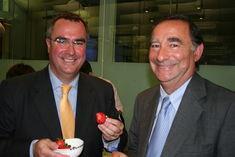
British Summer Fruits took the opportunity to engage with the country’s politicians last week, as parliament rallied behind the home-grown soft-fruit crop.
BSF chairman Laurence Olins delivered a presentation to members of the Parliamentary British Fruit Industry Group, in Westminster. The focus inevitably fell on polytunnels and Olins said the £270 million of domestic berries that were sold through UK supermarkets would have been significantly reduced were it not for the under-fire structures.
“They protect the crop, it’s as simple as that,” Olins said. “That extends the season and reduces the use of pesticides. We now produce 90 per cent Class I fruit, rather than 50 per cent. [Without polytunnels], the supermarkets would have half the programme for British fruit, for six to eight weeks and not six months.
“We have a very modern industry with lots of young farmers, but there is no clarity whatsoever as to how each local authority is going to view us. We need some certainty, and to know where we stand, as [the current situation] is putting a dampener on the industry’s growth.”
MP for Hereford Paul Keetch, pictured with Olins, questioned the need for polytunnels to be in place 12-months a year and said his constituents have serious concerns about the impact of the structures on the region’s tourism. Olins said: “There has to be a measure of self control - there cannot be a situation where a farmer can have a polytunnel up year-round with no planning legislation. We only grow for six months.”
He pointed out that the NFU/BSF code of practice on polytunnels has the support of the UK’s major retail customers. “If people do not adhere, they are in danger of losing their status as a supermarket supplier,” he warned.
Defra minister Ben Bradshaw had earlier told fellow MPs during question time in The House of Commons: “I think polytunnels have been vital in the success of our strawberry growers in extending the growing season. I don’t think there can be any doubt that it is far better for the environment and local economies in this country to eat British strawberries.”



